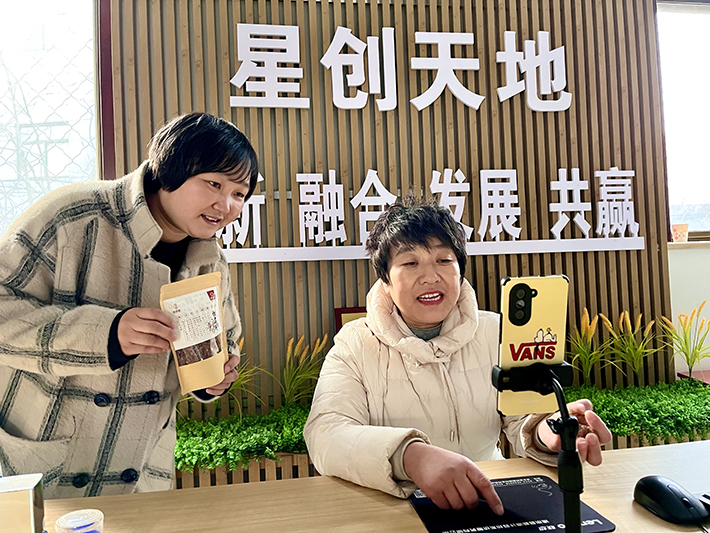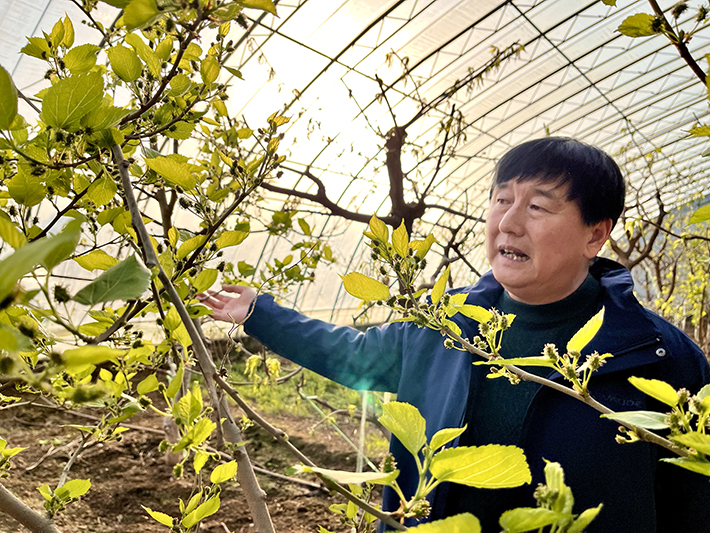|
||||||||||
| Home Nation World Business Opinion Lifestyle ChinAfrica Multimedia Columnists Documents Special Reports |
|
||||||||||
| Home Nation World Business Opinion Lifestyle ChinAfrica Multimedia Columnists Documents Special Reports |
| ChinAfrica |
| Fruits of Innovative Farming |
| Farmers in north China township reap rich harvest during the Spring Festival thanks to modern agricultural practices |
| By Ma Li 丨VOL. 15 March 2023 ·2023-02-23 |

Wang Shiling (right) teaches a farmer how to sell nuts with a smartphone
The agro-industrial parks in Laishui County, Hebei Province in north China, were operating at full capacity during the Spring Festival, which was celebrated in January this year. Local mushrooms were processed and sold across the country. Mulberry trees from the Republic of Korea and Singapore have also been planted in the parks, and their fruits are sold in the stores in major cities. The past two years have witnessed a visible development of modern agriculture in Laishui, thanks to the application of cutting-edge technology and diversification.
Mushroom demand
During the Spring Festival holiday from 21 to 27 January, Zhang Lihua, general manager of Huayi Guye, a mushroom producing firm, spent his time taking calls. According to him, more than 100 tonnes of Hypsizygus marmoreus were sold during the seven-day holiday. This is a new variety of mushroom that was introduced in 2019 and is well-liked by consumers for its beautiful appearance, exquisite flavour, and nutritional value.
In Wangcun Township in southeastern part of Laishui County, Zhang built smart mushroom greenhouses in October 2019 with a production capacity of 150 tonnes a month. They prepared 150 tonnes of Hypsizygus marmoreus for sales during the Spring Festival holiday in January 2020, but sales were underwhelming because of abrupt outbreak of the COVID-19 pandemic. He suffered a great loss.
The business has slowly improved after the pandemic prevention and control measures were adjusted in China in December 2022. Companies’ production and sales have gradually returned to normal as a result of more efficient logistics, and Hypsizygus marmoreus is currently selling very well, which gives him reason to be optimistic about the future. “I am sure I can make up for the losses of the past several years,” he said.
Zhang started growing edible mushrooms in the 1990s. He has already mastered the techniques of growing dozens of varieties of edible mushrooms, such as Morchella esculenta, Stropharia rugosoannulata and Dictyophora indusiata. With the application of the Internet of Things technologies, the entire production process in his greenhouses has become intelligent. “Temperature, humidity and light can be intelligently controlled inside the greenhouses, saving labour and significantly improving our economic benefits,” Zhang said.
Zhang noted that he would spare no effort in encouraging and supporting local farmers to grow mushrooms this year. He plans to make the headquarters of his company a hi-tech hatching centre to develop new varieties of mushrooms and promote new varieties and technologies in all villages throughout the county, so that different villages can grow different varieties of mushrooms.

Guo Baolin presents a recently introduced mulberry variety
Robust mulberry industrial chain
It was below zero degree Celsius in Laishui during the Spring Festival, but the temperature inside the greenhouses of Guo Baolin’s cooperative in Yongyang Township reached 20 degrees.
“This mulberry variety is from south China’s Guangdong Province and bears fruit early. It generates a yield of 2,000 kg per mu (0.067 acre) and is harvested prior to the Spring Festival. That variety of mulberry is imported from Singapore, and has a yield of between 4,000 and 5,000 kg per mu,” Guo, president of a local farmers’ cooperative, introduced, pointing to two different varieties.
About 10 years ago, Yongyang Township where Guo lives was facing a resource shortage as a result of the over-use of limestone. In recent years, the general public has progressively come to understand the importance of environmental protection and the sustainable agricultural development. Guo’s cooperative to grow mulberry trees is a result of this transition.
He has conducted extensive research over the last two years in collaboration with specialists from China Agricultural University, Hebei Agricultural University, and Northwest A&F University. He has been successful in year-round mulberry cultivation.
He also created a network of industrial facilities to process mulberries. Currently, his team sells over 60 organic mulberry-related products, such as mulberry liqueur and leaf tea. “By utilising modern high technologies, we can turn the fruits and leaves into healthy food with high value addition,” he said.
Intelligent brain
“Hello everyone. Thank you for watching my live broadcast. Today, I will explain to you how to take care of the thin-shell walnut in winter,” said Wang Shiling, founder of an agricultural innovation station, during a livestreaming session. Unlike the majority of people who visit their parents and relatives around the Spring Festival, Wang was educating the public about contemporary agriculture technology through live broadcasts. She has a large following across the country as a result of her extensive study into the production and processing of thin-shell nuts over many years.
In China, Laishui is well-known for its walnuts. More than 4 million walnut trees are planted in the county with annual sales reaching 1 billion yuan ($147 million), creating jobs for 45,000 households. “Today, many farmers sell their nuts using their smartphones. However, presenting them in front of the smartphone is not enough for successful sales. It requires technique and knowledge of nut cultivation,” said Wang. She helps local farmers by sharing her knowledge.
Agricultural innovation stations like the one Wang is working for shoulder the responsibility of introducing modern technology to farmers throughout the county, and serve as farmers’ “intelligent brain.” According to Wang, her station has played a big role in programmes such as poverty eradication and rural revitalisation.
“Industrial upgrade and talent cultivation are essential parts of our rural revitalisation drive. Every year, I invite agricultural experts to the farms in Laishui to educate farmers in managing their crops, and the experts are playing an important role in developing the industries with Laishui characteristics,” she said.
|
||||||||||||
| About Us | Contact Us | Advertise with Us | Subscribe |
| Copyright Beijing Review All rights reserved 京ICP备08005356号-5 京公网安备110102005860号 |